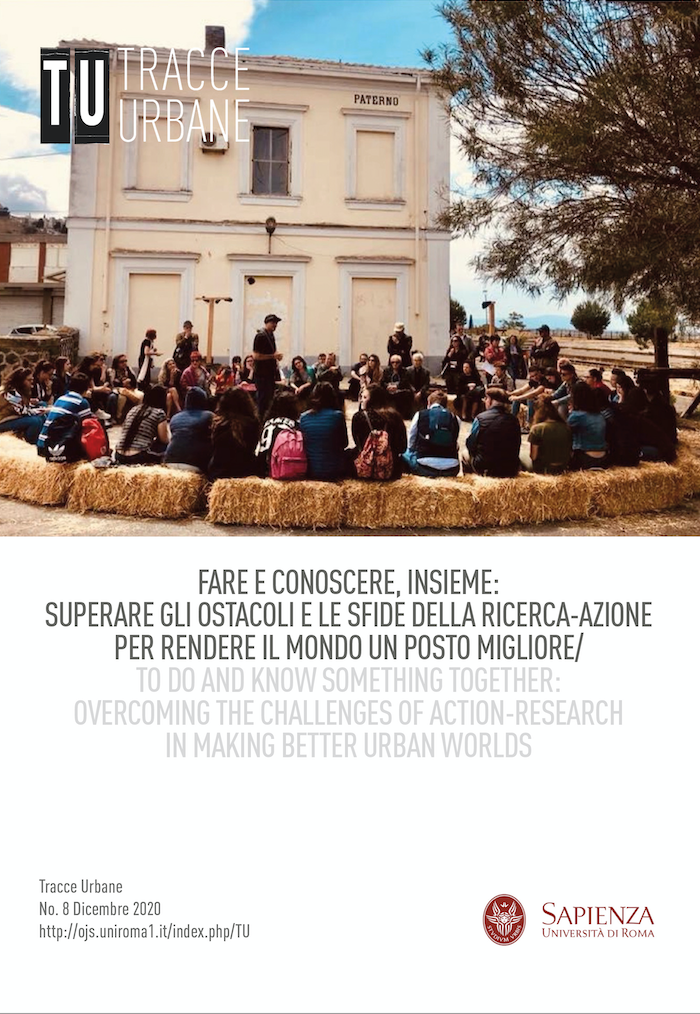Your culture, my values: the perpetuation of power relations in collaborative research in academic environments
DOI:
https://doi.org/10.13133/2532-6562_4.8.17046Parole chiave:
collaborative research, intercultural exchange, power imbalancesAbstract
Questo articolo indaga i problemi associati alla ricerca collaborativa nelle scuole di specializzazione dei paesi più sviluppati, quando essa si interessa alle relazioni di potere tra paesi sviluppati e paesi in via di sviluppo. L’articolo esplora la mancanza di conoscenza dell’influenza del ricercatore, la partecipazione parziale degli stakeholder locali e la permanenza delle relazioni di potere pre-esistenti. L’autrice condivide una riflessione sulla sua esperienza di studentessa che, insieme ad altri undici studenti internazionali, supervisionati da due professori americani, provenienti da un’università americana, nell’autunno del 2019, hanno studiato e viaggiato in Sierra Leone, dove hanno lavorato in collaborazione con studenti e professori locali. Sebbene il progetto fosse pensato per essere collaborativo, ha finito per produrre una collaborazione parziale. L’articolo si conclude con raccomandazioni per evitare gli stessi problemi.
This article investigates problems arising from collaborative research in graduate schools in the developed world. It specifically examines how it relates to developed and developing countries’ power relations and explores the lack of knowledge of the influence of researcher, partial participation of local stakeholders, and a predominance of power relations. The author reflects on her experience as one of the eleven international students, supervised by two American professors, from an American university, who, in the Fall of 2019, studied and traveled to Sierra Leone, where they worked in collaboration with local students and professors. Although the project was meant to be collaborative, it ended up producing partial collaboration. The article concludes with recommendations to avoid the same issues.
Riferimenti bibliografici
Allmendinger P., Tewdwr-Jones M. (1997). «Mind the Gap: Planning Theory–Practice and the Translation of Knowledge into Action - A Comment on Alexander». Environment and Planning B: Planning and Design 24, 6: 802–6. Doi: 10.1068/b240802.
Berg LD. (2011). «Geographies of Identity I: Geography - (Neo) Liberalism - White Supremacy». Progress in Human Geography 36, 4: 508–17. Doi: 10.1177/0309132511428713.
Bowen S., Martens P. (2005). «Demystifying Knowledge Translation: Learning from the Community». Journal of Health Services Research & Policy 10: 203–11. Doi: 10.1258/135581905774414213.
Boyle A., Maguire S., Adrian M., Milsom C., Nash R., Rawlinson S., Turner A., Wurthmann S., and Conchie S. (2007). «Fieldwork Is Good: The Student Perception and the Affective Domain». Journal of Geography in Higher Education 31, 2: 299–317. Doi: 10.1080/03098260601063628.
Fyfe C. (1968). «Book Reviews: Burden of Empire—An Appraisal of Western Colonialism in Africa South of the Sahara. By L. H. Gann and Peter Duignan». Race 10, 2:240–42. Doi: 10.1177/030639686801000229.
Jirón P. (2018). «The challenges of ethnographic practice in current urban complex situations». In: Plows A. (ed.), Messy Ethnographies in Action, 1st ed., 159–67. Delaware: Vernon Press.
Kargbo MF. (2019). «Methodist Girls High School Heritage Club Performs Naming Ceremony». Monuments and Relics Commission, text available on the website: http://mrcsl.org/ methodist-girls-high-school-heritage-club-performs-naming- ceremony/, 09/09/2020.
Kargbo MF. (2018). «Three Heritage Clubs Tours Bunce Island». Monuments and Relics Commission, text available on the website: http://mrcsl.org/three-school-heritage-clubs-tour-bunce- island/, 10/09/2020.
Minkler M. (2000). «Using Participatory Action Research to Build Healthy Communities». Public Health Reports (1974-) 115, 2/3: 191–97. Doi: 10.1093/phr/115.2.191.
Ogden AC. (2007). «The View from the Veranda: Understanding Today’s Colonial Student» Frontiers: The Interdisciplinary Journal of Study Abroad. 15(1), 35-56. Doi: 10.36366/frontiers.v15i1.215.
Patel K. (2015). «Teaching and Learning in the Tropics: An Epistemic Exploration of ‘the Field’ in a Development Studies Field Trip». Journal of Geography in Higher Education 39: 584–94. Doi: 10.1080/03098265.2015.1084499.
Suarez-Balcazar Y. (2020). «Meaningful Engagement in Research: Community Residents as Co‐creators of Knowledge». American Journal of Community Psychology 65. Doi: 10.1002/ajcp.12414.
Watson V. (2009). «Seeing from the South: Refocusing Urban Planning on the Globe’s Central Urban Issues». Urban Studies 46, 11: 2259–75. Doi: 10.1177/0042098009342598.
West W., Manson AT. (2002). «Hearing What Research Participants Are Really Saying: The Influence of Researcher Cultural Identity». Counseling and Psychotherapy Research 2, 4: 253–58. Doi: 10.1080/14733140212331384735.
World Bank (2019). «Sierra Leone Land ASA Policy Note”. World Bank, text available on the website: http://documents1. worldbank.org/curated/pt/856111560491680914/text/Support- to-the-Sierra-Leone-Land-Agenda-Policy-Note.txt, 10/9/2020.
##submission.downloads##
Pubblicato
Come citare
Fascicolo
Sezione
Licenza
NOTA DI COPYRIGHT
Proposta di licenza Creative Commons
1. Proposta per riviste Open Access
Gli autori che pubblicano su questa rivista accettano le seguenti condizioni:
Gli autori mantengono i diritti sulla loro opera e cedono alla rivista il diritto di prima pubblicazione dell'opera, contemporaneamente licenziata sotto una Licenza Creative Commons - Attribuzione che permette ad altri di condividere l'opera indicando la paternità intellettuale e la prima pubblicazione su questa rivista.
Gli autori possono aderire ad altri accordi di licenza non esclusiva per la distribuzione della versione dell'opera pubblicata (es. depositarla in un archivio istituzionale o pubblicarla in una monografia), a patto di indicare che la prima pubblicazione è avvenuta su questa rivista.
Gli autori possono diffondere la loro opera online (es. in repository istituzionali o nel loro sito web) prima e durante il processo di submission, poiché può portare a scambi produttivi e aumentare le citazioni dell'opera pubblicata (Vedi The Effect of Open Access).


